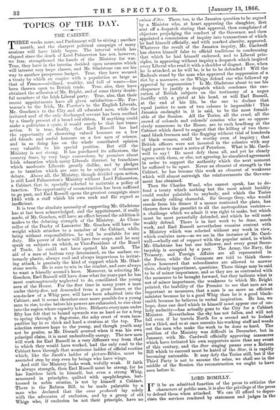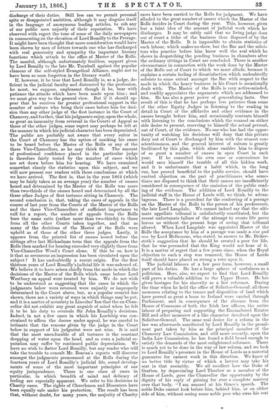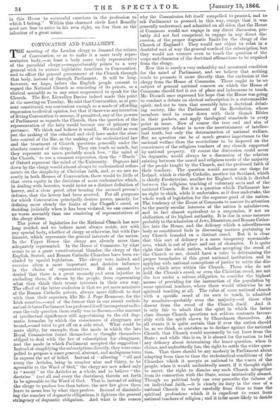LORD ROMILLY.
IF it be an admitted function of the press to criticize the characters of public men, it is also the privilege of the press to defend them when attacked. We can ill afford to depre- ciate the services rendered by statesmen and judges in the
discharge of their duties. Still less can we permit personal spite or disappointed ambition, although it may disguise itself in the language of anonymous leading articles, to rob any of our public men unjustly of their reputation. We have observed with regret the tone of some of the daily newspapers in commenting on the elevation of Lord Romilly to the Peerage. It might have been thought that more consideration would have been shown by men of letters towards one who has discharged with real generosity and sympathy the important literary functions which attach to the office of Master of the Rolls. The manful, although unfortunately fruitless, support given by Lord Romilly to the late Mr. Turnbull against the popular clamour of the self-styled Evangelical Alliance, ought not to have been so soon forgotten in the literary world.
If, however, it be true that Lord Romilly is, as a judge, de- ficient in the judicial faculty and distrusted by the profession, he must, we suppose, unpleasant though it be, bear with patience the attacks which have been made upon him ; and we must give way to the general view. But if it should ap- pear that he receives far greater professional support in the number of suitors who bring their cases before him for deci- sion than any other judge of the first instance in the Court of Chancery, and further, that his judgments enjoy, upon the whole, as great an immunity from reversal in the Courts of Appeal as those of the other judges, some regret may perhaps be felt at the manner in which his judicial character has been depreciated. The public are probably not aware that every suitor in the Court of Chancery has the option of marking his cause to be heard before the Master of the Rolls or any of the three Vice-Chancellors, as he may think fit. The amount of professional confidence placed in the particular judge is therefore fairly tested by the number of cases which are set down before him for hearing. We have examined somewhat closely the statistics upon this subject, and we will now present our readers with three conclusions at which we have arrived. The first is, that in the year 1864 (which may be fairly taken as an average year) the number of causes beard and determined by the Master of the Rolls was more than two-thirds of the causes heard and determined by all the three other Judges of first instance sitting in Chancery. The second conclusion is, that, taking the cases of appeals in the course of last year from the Courts of the Master of the Rolls and the three Vice-Chancellors of sufficient importance to call for a report, the number of appeals from the Rolls bore the same ratio (rather more than two-thirds) to those from all the other Courts taken together, and that as many of the decisions of the Master of the Rolls were upheld as of those of the other three judges. Lastly, it appears from the printed list of causes issued before the sittings after last Michaelmas term that the appeals from the Rolls then marked for hearing exceeded very slightly those from Vice-Chancellor Wood's Court alone. If this be so, how is it that so erroneous an impression has been circulated upon the subject ? It has undoubtedly a recent origin. For the first thirteen years of Lord Romilly's judicial life it was unheard of. We believe it to have arisen chiefly from the mode in which the decisions of the Master of the Rolls which came before Lord Westbury on appeal were treated by him. We do not wish to be understood as suggesting that the cases in which the judgments below were reversed were unjustly or improperly determined in the Court above, but, as a popular essayist has shown, there are a variety of ways in which things may be put, and it is a matter of notoriety in Lincoln' Inn that the ex-Chan- cellor did not exhibit any great anguish of mind when he felt it to be his duty to overrule Sir John Romilly.'s decisions. Indeed, in not a few cases in which his Lordship was con- strained to affirm the decree ,under appeal, he was careful to intimate that the reasons given by the judge in the Court below in support of his judgmitnt were not wise. It is said that the most unendurable of all tortures is the constant dropping of water upon the head, and so even a judicial re- putation may suffer by continued public depreciation. We have no wish to flatter Lord Romilly, but any reader who will take the trouble to consult Mr. Beavan's reports will discover amongst the judgments pronounced at the Rolls during the fourteen years of Lord Romilly's judicial life, sound develop- ments of some of the most important principles of our
-equity jurisprudence. There is one class of cases in particular, in which breadth of mind and delicacy of feeling are especially apparent. We refer to his decisions in Charity cases. The rights of Churchmen and Dissenters have been equally safe under his protection. The result has been that, without doubt, for many years, the majority of Charity cases have been carried to the Rolls for judgment. We have alluded to the great number of causes which the Master of the Rolls decides in Court during the year. This, however, gives but a faint idea of the amount of judicial work which he discharges. It may be safely said that no living judge does out of court a tithe of the business thus disposed of by the Master of the Rolls. It is impossible to obtain statistics of such labour, which makes no show, but the Bar and the solici- tors who practise before him know well the zeal which he shows in despatching the pending business in chambers after the ordinary sittings in Court are concluded. There is another circumstance in connection with the work done by the Master of the Rolls out of Court to which we must allude, because it explains a certain feeling of dissatisfaction which undoubtedly subsists to some extent amongst the Bar with respect to the mode in which the heavy business in his Court is occasionally dealt with. The Master of the Rolls is very active-minded, and readily appreciates the arguments which are addressed to him. He has also a great power of generalizing facts. One result of this is that he has perhaps less patience than some of the other Equity Judges in listening to the reading in detail in Court of the affidavits and other evidence in the causes brought before him, and occasionally contents himself with listening to the conclusions which the counsel on either side desire to present, reserving to himself the actual perusal, out of Court, of the evidence. No one who has had the oppor- tunity of watching his decisions will deny that this private duty out of Court is discharged by him with the utmost con- scientiousness, and the general interest of suitors is greatly facilitated by this plan, which alone enables him to dispose of so great a number of causes in open Court in each
year. If he consulted his own ease or convenience he would save himself the trouble of all this hidden work, and it is unfortunate that a habit which, in the long run, has proved beneficial to the public service, should have excited objection on the part of practitioners who some- times are disposed to think that their causes are insufficiently considered in consequence of the omission of the public read- ing of the evidence. The addition of Lord Romilly to the judicial staff in the House of Lords will, we think, be advan- tageous. There is a precedent for the conferring of a peerage on the Master of the Rolls in the person of his predecessor, the late Lord Langdale. We cannot indeed say that the ulti- mate appellate tribunal is satisfactorily constituted, but the recent unfortunate failure of the attempt to create life peers leaves us without the present hope of seeing that tribunal altered. When Lord Langdale was appointed Master of the Rolls the acceptance by hini of a peerage was made a sine qua non by Lord Melbourne, who stated, in answer to Mr. Bicker- steth's suggestion that he should be created a peer for life, that he was persuaded that the King would not hear of it. It is a matter of regret that a few years since, when the Royal objection to such a step was removed, the House of Lords itself should have placed so strong a veto upon it.
The judicial labours of a law peer form, however, a small part of his duties. He has a large sphere of usefulness as a politician. Here, also, we expect to find that Lord Romilly will prove a valuable addition to the Upper House. He has given hostages for his sincerity as a law reformer. During the time when he held the office of Solicitor-General, all those measures relating to the tenure and disposition of land which have proved so great a boon to Ireland were carried through Parliament, and in consequence of the absence from the House of Commons of both the Irish law officers, the entire labour of preparing and supporting the Encumbered Estates Bill and other measures of a like character devolved upon the Solicitor-General. The same real desire for a reform in the law was afterwards manifested by Lord Romilly in the promi- nent part taken by him as the principal member of the Chancery Law Commission, and still more recently, upon the India Law Commission, he has found a field broad enough to satisfy the demands of the most enlightened reformer. There is much yet to be done in the way of law reform, and we look to Lord Romilly's presence in the House of Lords as a material guarantee for earnest work in this direction. We know of no better title by virtue of which a lawyer may take his seat in that assembly. We all recollect how the Duke of Grafton, by depreciating Lord Thurlow as a member of the House of Lords, gave the Chancellor the opportunity by the dignity of his reply of gaining for ever a complete mastery over that body, "I am amazed at his Grace's speech. The noble Duke cannot look before him, behind him, or on either side of him, without seeing some noble peer who owes his seat
in this House to successful exertions in the profession to which I belong." Within this charmed circle Lord Readily need not fear to enter in his own right, no less than as the inheritor of a great name.
































 Previous page
Previous page